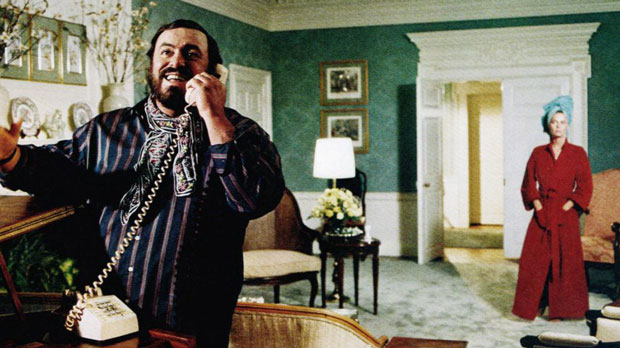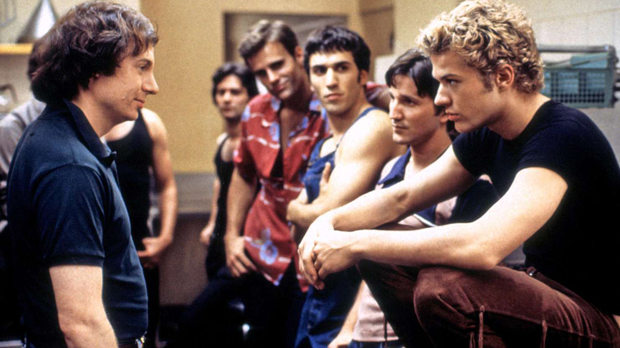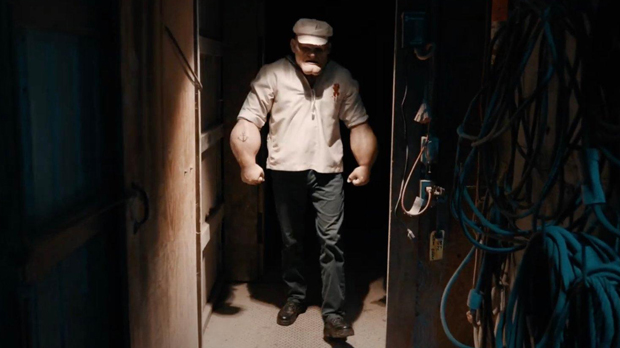 Yes, Giorgio (1982) MGM/Comedy-Musical RT: 110 minutes Rated PG (language, thematic elements, sexual situations) Director: Franklin J. Schaffner Screenplay: Norman Steinberg Music: Michael J. Lewis Cinematography: Fred J. Koenekamp Release date: September 24, 1982 (US) Cast: Luciano Pavarotti, Kathryn Harrold, Eddie Albert, Paola Borboni, James Hong, Beulah Quo, Norman Steinberg, Rod Colbin, Kathryn Fuller, Joseph Mascolo, Karen Kondazian, Leona Mitchell, Kurt Adler, Emerson Buckley, Alexander Courage, Paul Marin, Danny Butch, Dominique Pinassi. Box Office: $2.2M (US)
Yes, Giorgio (1982) MGM/Comedy-Musical RT: 110 minutes Rated PG (language, thematic elements, sexual situations) Director: Franklin J. Schaffner Screenplay: Norman Steinberg Music: Michael J. Lewis Cinematography: Fred J. Koenekamp Release date: September 24, 1982 (US) Cast: Luciano Pavarotti, Kathryn Harrold, Eddie Albert, Paola Borboni, James Hong, Beulah Quo, Norman Steinberg, Rod Colbin, Kathryn Fuller, Joseph Mascolo, Karen Kondazian, Leona Mitchell, Kurt Adler, Emerson Buckley, Alexander Courage, Paul Marin, Danny Butch, Dominique Pinassi. Box Office: $2.2M (US)
Rating: ***
As a lifelong devotee of cinema, I’ve learned a great number of things pertaining to the subject. One of them is this: not every popular singer is meant to have an acting career. For every success like Elvis, Frank Sinatra and Cher, there are twice as many failures like Tony Bennett (The Oscar), Rick Springfield (Hard to Hold), Mariah Carey (Glitter), Britney Spears (Crossroads) and Madonna in nearly every movie she’s been in.
Some would argue that opera singer Luciano Pavarotti belongs on that list for his performance in Yes, Giorgio, an instant box office flop billed by MGM as a “glorious uproarious love story”. It’s true, the big guy can’t act, but neither could Elvis and look at how many movies he starred in. What Luciano can do is sing and he gets to do plenty of it in his one and only acting gig.
Pavarotti stars as Giorgio Fini, a world famous operatic tenor about to embark on a concert tour in the US. His first stop is Boston where he receives a phone call from The Met (in NYC) asking him to reconsider his position on performing there. He refuses. He hasn’t even set foot in the place since a disastrous performance there seven years earlier. The stress of the phone call causes him to lose his voice during rehearsal prompting his manager/friend Henry (Albert, Green Acres) to call in throat specialist Dr. Pamela Taylor (Harrold, Raw Deal).
The couple-to-be gets off to a rocky start when Giorgio refuses to let Pamela examine him because she’s a woman and therefore a nurse not a doctor. Fear of losing his voice permanently makes him change his mind. She diagnoses his problem as psychological, but tells him he has a (made-up) condition called “Steinmetz Syndrome”. One B-12 shot later, he’s miraculously cured.
Giorgio is so grateful, he visits her the next day at the hospital and invites her to his concert. She turns him down at first, but eventually agrees to attend and have dinner with him afterwards. The date doesn’t go well at all. She can’t stand all the fuss everybody makes over Giorgio everywhere he goes. He can’t believe somebody isn’t in awe of him. She leaves before the first course is served. So what’s Giorgio’s next move? Invite Pamela to spend a week with him in San Francisco, of course. Does she go with him? It wouldn’t be much of a rom-com if she didn’t.
Let me stop here to reveal a crucial piece of information. Giorgio is a married man. He has a wife and two kids back in Italy. When Pamela finds out, she doesn’t break it off with him then and there. They continue their adulterous affair. On top of that, she falls in love with Giorgio even though he makes her promise not to after spending their first night together. While their love story is (sort of) nice, I’m having a problem with the adultery part. Are we supposed to root for them as a couple? Do we want Giorgio leave his wife for Pamela? Are we supposed to believe Pamela is dumb enough to expect her lover to leave his wife for her? I certainly can’t say much for either character’s sense of morality.
At one point, Giorgio attempts to justify his actions by explaining his private life is his own business and completely separate from his family. HUH?! Giorgio and Pamela might be likable people and we might take a measure of pleasure in their joy, but it doesn’t change the fact that they’re committing adultery. If you ask me (or if you don’t), the makers should have eliminated this from the storyline altogether. It’s not like Yes, Giorgio would be completely devoid of conflict without it. What about Giorgio’s fear of performing at the Met? Will love help him overcome it? There’s your conflict! It’d work just as well if Giorgio was single.
Now that I’m done moralizing, let’s talk about Yes, Giorgio as it pertains to entertainment. I remember when it came out in Sept. ’82. MGM made a big deal of it being the movie debut of Pavarotti, one of the greatest tenors of all time. Producer Peter Fetterman described it as “a musical romance like those wonderful MGM films with Mario Lanza”. In fact, several veteran crew members of the old MGM musicals worked on Yes, Giorgio. It was supposed to be a big moneymaker. It didn’t make a nickel. The $19M musical rom-com opened and closed in a week, grossing a paltry $2.2M. Critics savaged it and audiences ignored it. The studio lost a lot of money. Luciano never acted again.
Do I think Yes, Giorgio is bad? I think it’s better than most people give it credit for, BUT it’s still laughable in ways the makers never intended. Although likable and charismatic, Pavarotti is no actor. He made a wise choice not quitting his day job for the glitz and glamour of Hollywood. Fortunately, his role in Yes, Giorgio requires him to sing often. He gets to sing a few nice arias as well as an original song called “If We Were in Love” (lyrics by Alan Bergman and Marilyn Bergman; music by John Williams) that was nominated for Best Song at the Oscars and Golden Globes.
Pavarotti has an amazing singing voice. When he uses it, Yes, Giorgio soars. Unfortunately, it comes crashing down when he speaks. He gets saddled with some truly heinous dialogue. When trying to convince Pamela to join him in San Francisco, he attempts to woo her with this hilariously awful line: “You are a thirsty plant. Fini can water you.” Her reply is just as bad if not worse: “I don’t want to be watered on by Fini.” It’s astonishing that both actors manage to keep straight faces. How many takes did they have to do before they stopped cracking up?
Harrold is a fine actress and does a pretty good job in Yes, Giorgio even if her character’s behavior is consistently inconsistent. One moment, she’s mad at Giorgio for not choosing her over his wife. The next, she’s flying to New York to support him at the Met. Pamela never fully makes sense as a character. She’s barely afforded any development beyond being strong-willed. One could question her common sense by asking why a clearly intelligent woman would even bother with a sexist like Giorgio, but such questions defeat the film’s intended purpose.
Come to think of it, their relationship isn’t all that well-developed either. The strangest thing about Yes, Giorgio is that we never see any scenes of them in bed together. There’s this one sequence where they have sex in every room of a friend’s mansion, but it’s shown from the perspective of the kitchen help (an older Chinese couple) burdened with calls for room service (EVERY room!) all night long- e.g. ice cream in the sauna. In lieu of a passionate sex scene, we get to see the happy couple have a big messy food fight in a kitchen. Yes, pies are involved.
Directed by Franklin J. Schaffner (Patton), Yes, Giorgio benefits from gorgeous scenery. The opening scenes in Italy are quite striking. The best moment is when Giorgio takes Pamela on a hot air balloon ride to visit friends in California’s wine country. This is when “If We Were in Love” plays on the soundtrack. Really, the whole of Yes, Giorgio is beautiful. Everything and every place looks so wonderful. It’s funny too. Sometimes it’s intentional; sometimes it’s not. The music is great, but we already went over that.
At the same time, the movie is just so misguided. I like it even though the central premise is wrong. I like the two main characters, but can’t condone their actions. In a typical romance movie, the viewer roots for the lovers to walk hand-in-hand into a happily ever after. Are we expected to do that here? I don’t see any ending for Yes, Giorgio that could be considered happy. This movie is so screwy I can’t help but enjoy it.




